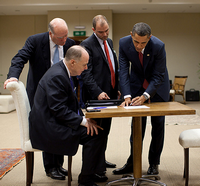President Barack Obama's address explaining the reasons for the U.S. intervention in Libya has already generated a flurry of responses. Some have lauded the speech as setting forth a set of grand strategic principles that will guide the U.S. response to the "Arab Spring." Others have decried it as lacking sufficient grand strategic vision. In reality, grand strategic principles rarely dictate specific courses of action in complicated situations, and a coherent grand strategy absolves no one from the responsibility of "muddling through."
Even if there is an "Obama doctrine," it is unclear how that doctrine matters for Libya, or how the doctrine's principles will affect the administration's approach toward Syria, Bahrain or Saudi Arabia. The particular complications of each case make the application of a single grand strategy difficult, if not impossible.
In fact, there is no simple dichotomy opposing grand strategy and muddling through. The world is complex, and grand strategies can often lead to unsettled ground. Often, a clear grand strategic idea without a clear concept of how to get from point A to point B makes muddling through inevitable. Meanwhile, the methods developed and interests revealed by muddling through a situation like Libya can coalesce into grand strategic principles if, by scrambling to justify a particular intervention, we create precedents. Because such precedents can be suboptimal, Daniel Nexon, a professor at Georgetown's School of Foreign Service, warns against "the development of general principles around specific cases," and suggests that the United States shouldn't "retcon" the Libyan War into a prefabricated grand strategic framework. Most aspects of life, for states and people, involve muddling through, even if we do have a grand strategy. For instance, British grand strategy in the 18th and 19th centuries may well have been focused around preventing French domination of the European continent, but this orientation offered only tenuous guidance in solving most of the everyday foreign policy crises that faced the empire.

